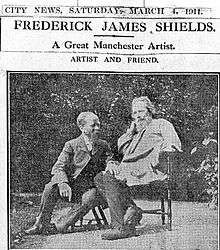Charles Rowley (socialist)
Charles Rowley ("Rowley of Ancoats"; 1839 Ancoats – 1933 Handforth) was a British socialist and councillor of Ancoats, Manchester.

He was inspired by William Morris, and a leading member of the Ancoats Brotherhood. Amongst his other associates was the poet Mathilde Blind.[1][2] In addition to founding public exhibitions and flower shows, he initiated concerts given at the city's parks; this work is amongst the earliest examples of orchestral concerts given for the public's benefit.[2]
Life
Rowley was the son of Charles Rowley ("a Radical of the old type and a Peterloo man"), born at Ancoats. He was in childhood rather delicate which restricted his education; later he learned well and also taught in the Bennett Street Schools, Oldham Road. In 1875 he was elected to the city council; in 1878 he gave up his Bennett Street work. He next began a movement called "Recreation in Ancoats" which was succeeded by the Ancoats Brotherhood. The movement encouraged cottage-window gardening and provided music in the local parks. From 1881 the Sunday afternoon lectures brought many notable speakers to Ancoats. Rowley became a magistrate in 1893. He was bonoured with an honorary M.A. degree by the Victoria University in 1902. He was the author of Fifty Years of Work without Wages, 1912.
References
- Symons, Arthur; Richard Garnett (1900). "Memoir by Dr. Garnett". Poetical works of Mathilde Blind. T. F. Unwin. p. 35.
- Young, Percy Marshall (1969). "Music for the people: Pioneer work in Ancoats". The concert tradition from the Middle Ages to the twentieth century. p. 229.
- Frangopulo, N. J., ed. (1962) Rich Inheritance. Manchester: Education Committee; p. 152